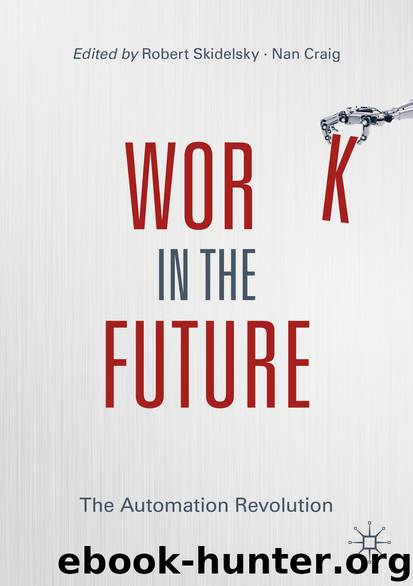Work in the Future by Unknown

Author:Unknown
Language: eng
Format: epub
ISBN: 9783030211349
Publisher: Springer International Publishing
Implications for Jobs
If the argument advanced thus far is sound, then computers will never be conscious: only Weak AI is possible. Let us close by briefly considering what implications this might have for jobs.
It is conceivable that computers will come to compete with or replace humans in many jobs, including those that require cognitive ability, even though computers will never be conscious. Consider language translation: while a human translator must apply effort to understand what is meant by two different languages, so that she can understand what is said in one and then work out what phrase best expresses this meaning in the other, Google Translate does not know or understand anything about language whatsoever. All it registers is the frequency of millions of possible word sequences. The program translates between French and English based on a huge quantity of examples of French-English and English-French translations that were fed into it. These examples, combined with various mechanisms of symbol manipulation, enables language translation to take place, even though the program has no understanding of the meaning being expressed in either language. So despite the fact that it cannot understand anything, it may not be long before Google Translate can rival human translators.
This sort of example leads some to suggest that there are no jobs off limits to robots. Ford (2015: 240), for example, writes that ‘Even occupations that we might expect to be reserved exclusively for people would be at risk.’
That is a stretch. Although some tasks (such as language translation) can be completed without conscious mental states, others cannot. Let us consider three mental states: empathy, responsibility and creativity. These three are all impossible without consciousness, and many jobs depend upon one or more of them.
To start with empathy: because AI will never be conscious, it will never be empathetic. And no matter how good computers get at imitating empathy, people will know that the computer’s ‘care’ is only mechanical with no actual empathy behind it. A machine may learn to recognize particular emotions through external indicators such as changes in one’s face or tone of voice, but its empathetic responses would amount to nothing more than ‘hot air’.
Of course, humans are very good at anthropomorphizing—many people love their teddy bears—and there are likely to be some people who are happy with robot carers. However, the point is that there will also always be some (and I would suspect it would be most) people who would only accept a carer who actually cares. Such jobs would be impossible for Weak AI.
Consider next responsibility. There are many roles that people would only want occupied by a responsible person, such as the roles of judges, policemen and politicians. AI may be able to help such people make decisions, but the actual decision would always have to be made by a fully responsible person who can be held accountable for it: no one would accept a completely irresponsible and unaccountable judge who blames all his bad decisions on an algorithm. The need for responsibility is also present in transportation jobs.
Download
This site does not store any files on its server. We only index and link to content provided by other sites. Please contact the content providers to delete copyright contents if any and email us, we'll remove relevant links or contents immediately.
Kathy Andrews Collection by Kathy Andrews(10544)
The remains of the day by Kazuo Ishiguro(7570)
Spare by Prince Harry The Duke of Sussex(4217)
Paper Towns by Green John(4175)
The Body: A Guide for Occupants by Bill Bryson(3813)
Be in a Treehouse by Pete Nelson(3230)
Harry Potter and the Goblet Of Fire by J.K. Rowling(3064)
Goodbye Paradise(2972)
Never by Ken Follett(2904)
Into Thin Air by Jon Krakauer(2711)
The Remains of the Day by Kazuo Ishiguro(2626)
The Genius of Japanese Carpentry by Azby Brown(2613)
The Cellar by Natasha Preston(2602)
Drawing Shortcuts: Developing Quick Drawing Skills Using Today's Technology by Leggitt Jim(2534)
120 Days of Sodom by Marquis de Sade(2444)
Architecture 101 by Nicole Bridge(2355)
Machine Learning at Scale with H2O by Gregory Keys | David Whiting(2308)
The Man Who Died Twice by Richard Osman(2304)
Industrial Automation from Scratch: A hands-on guide to using sensors, actuators, PLCs, HMIs, and SCADA to automate industrial processes by Olushola Akande(2109)
